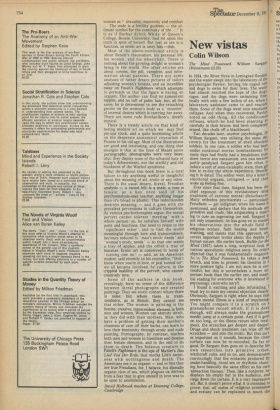New vistas
Colin Wilson
The Mind Possessed. William Sargant (Heinemann £3.25) In 1924, the River Neva in Leningrad flooded, and the water swept into the laboratory of the 'psychologist Pavlov, forcing his caged rats and dogs to swim for their lives. The water
had almost reached the tops of the dogs cages, and the dogs were swimming frail' tically with only a few inches of air, when
laboratory assistant came in and rescued them. Some of the dogs went into emotional collapse. And when they recovered, Pavlov noted an odd thing. All the conditioned reflexes, which he had been planting sd carefully in their brains, had been completelY erased, like chalk off a blackboard.
Two decades later, another psychologist, Dr William Sargant, was utilising the same dis covery for the treatment of shell shocked soldiers. In one case, a soldier who had been under continual mortar bombardment fur many days had finally had a breakdown from sheer terror ana exnaustion, ana paa oeconie partly paralysed. Sargant gave him ether, td
induce a sort of semi-cataleptic state, then gut him to re-live the whole experience, describing it in detail. The soldier went into a kind el emotional orgasm, collapsed — and then woke up feeling fine. Ever since that time, Sargant has been the chief exponent of this revolutionary drug treatment of extreme mental disturbances' Many orthodox psychiatrists — particularly Freudians — get indignant when his name If mentioned, and declare that his methods are primitive and crude, like amputating a man.5 leg to cure an ingrowing toe nail. Sargant 15 not only impenitent: he has gone on to extend, his observations into the whole field 01 religious ecstasy, faith healing and brainwashing, and insists that this approach Uncovers important truths about the depths 01 human nature. His earlier book, Battle for the Mind (1957) takes a long, sceptical look at various apocalyptic religious sects. Its critics objected that it was fundamentally negative. So in The Mind Possessed, he takes a deeP breath, and tries to present his theories in 0 more positive light. I am not sure he is suc• cessful; but this is nevertheless a more portant book than the earlier one, and essen• tial reading for everyone who is interested 10 psycnology. (And who isn't?) I found it exciting and also infuriating. I must try to state my central objection clearlY. Obviously, Sargant is right when he says that severe mental illness is a kind of imprinting. You might compare it to a scratch on a gramophone record which, if it is deeP enough, will always make the gramophone needle jump at a certain point. And if it goes on too long, or the illness recurs after treat' ment, the scratches get deeper and deeper. Drugs and shock treatment can wipe off the scratches — and also the music. But that isn't as important as it sounds, because the clean surface can now be re-recorded. So far so good. Dr Sargant then goes on to describe his own researches into primitive tribes, witchcraft cults, and so on, and demonstrates convincingly that the ecstacies produced bY snake-handling, ritual sex or rhythmic chanting have basically the same effect as his own 'abreaction therapy.' Then, like a conjuror, he displays his empty hat to the audience, and rings down the curtain. It is a very impressive act. But it doesn't prove what it is intended to prove: that all states of religious possession and ecstasy can be explained in much the
same terms as mentally sick patients. For example, he mentions Father Surin, the priest Who spent so much time trying to cast devils out of the possessed nuns of Loudun, and ended up being possessed himself. Aldous Huxley writes about this, and leaves no doubt. that, in spite of these self-induced neuroses, Surin was a genuine religious mystic and something of a saint. And the fact that Sargant is right about Surin's possession by devils doesn't place him in a position to judge, or even understand, his religious ecstasies. He is guilty of a kind of logical non sequitur.
Still, it would be unfair to make too much of this, because if you ignore what he thinks he's proving, and concentrate on what he can prove so brilliantly, it becomes clear that he is actually opening up new vistas in psychology, I myself had a rather uncomfortable opportunity to gain fresh insight into these matters last summer when I got severely overworked, and began suffering from 'panic attacks.' The basic trouble was mental exhaustion, which confines the mind in a narrow cell. In such a state, it is easy to lose perspective, exaggerate every trivial problem, and to fall into a bad habit of being negative and sick, intensified by your fear of making a habit of it. And after some weeks of floundering deeper into this mental swamp, I could see clearly that Sargant's method was useful and valid; his treatment would have lifted me out of it. As it was, with the help of a lot of self-analysis, and a basic certainty that the trouble was simply 'flat batteries,' I slowly and clumsily lifted myself out of it, like a glider slowly, regaining height. It was a nasty but fascinating experience, making me intensely aware that both the problem and the solution lie in our mental freedom. There was the awareness that it was 1 who decided whether to turn the nose of the glider down or up.
Sargant, wholly preoccupied with his physical models, is unconcerned with this intentional element in mental illness. The book seems to me wholly right as far as it goes: but then it stops dead. But perhaps, on second thoughts, this is not the least of its virtues. If the reader wants any more, he will have to think it out for himself.
Cohn Wilson's book, The Occult, has been recently republished by Mayflower paperbacks.











































 Previous page
Previous page